| SHADOWS ON THE WALL | REVIEWS | NEWS | FESTIVAL | AWARDS | Q&A | ABOUT | TALKBACK | |||||||||||||||||||||||||||||
 Shadows off the beaten path Shadows off the beaten pathIndies, foreigns, docs and shorts...
On this page:
A BRIXTON TALE |
THE DJINN |
SAINT-NARCISSE
| |||||||||||||||||||||||||||||
| See also: SHADOWS FILM FESTIVAL | Last update 15.Sep.21 | |||||||||||||||||||||||||||||
|
A Brixton Tale Review by Rich Cline | 
| 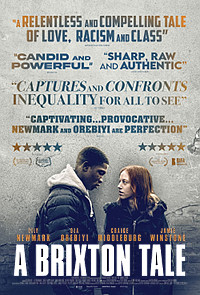 dir Darragh Carey, Bertrand Desrochers scr Rupert Baynham, Darragh Carey prd Rupert Baynham, Beau Rambaut with Lily Newmark, Ola Orebiyi, Craige Middleburg, Jaime Winstone, Dexter Padmore, Rose Kerr, Barney Harris, Michael Maloney, Sophie Ablett, Jonty Weston, Karen Ascoe, Ian Michaels release US Feb.21 sff, UK 17.Sep.21 21/UK 1h16 Is it streaming?
| 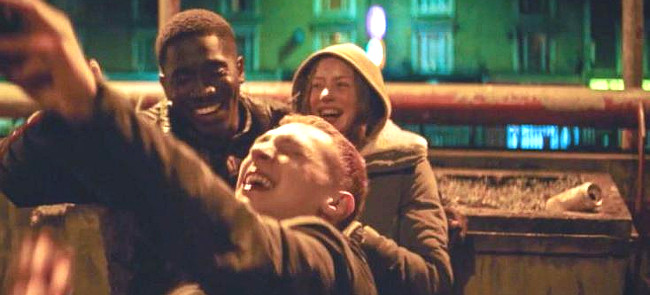 There's a burst of righteous anger in this British romantic drama, so it's easy to go along with the somewhat schematic story. And the strong lead actors add complexity to roles that feel underdeveloped. The various writers and directors have great ideas, but the way they tackle race and class issues head-on undermines the film's authenticity, straining to make thought-provoking statements at the expense of narrative and characters. In South London, Leah (Newmark) comes from a wealthy family and aspires to become a filmmaker, encouraged by her mentor Tilda (Winstone) to shoot edgy scenes of life in the neighbourhood. Then Leah becomes smitten by Benji (Orebiyi), a charismatic, straight-arrow nice guy who for some reason spends all his time with the drug-obsessed chucklehead Archie (Middleburg). Looking for spicier footage, Leah encourages Benji to try drugs himself and sparks a fight with her posh friend Charles (Harris). So Benji turns to his estate's gang leader (Padmore) for advice about what to do next. Everything that happens feels written by screenwriters, as nobody on-screen makes a truly organic decision about anything. The way the lines are so carefully drawn belittles the vital comments the premise could have made about racial injustice. The themes are still in here, and situations do challenge the audience to react. But it's always clear what the filmmakers want us to think. And this leaves the film feeling both contrived and overly cautionary. Newmark has strong presence, diving into the role with full physicality. But it's a problem that Leah is such a ruthless manipulator, because it leaves her more emotional moments ringing false. She always seems more fascinated by Benji than in love with him. By contrast, the excellent Orebiyi is able to give Benji layers of depth, a smart young man blinded by a lively young woman who pushes him to abandon his limits. Although again, it's very unlikely that he would go as far as the script pushes him. The many issues thrown around in this movie are urgent, but the storytelling is so unsubtle that it feels like it was made as an educational tool by schoolteachers, which leads to a few badly overwrought supporting performances. It's very nicely shot on locations that capture Brixton's distinct social textures, but the film neglects to explore the way communities weave together, simplistically setting each group against another (and sometimes against itself). A more character-based approach might have given the story a properly haunting kick.
|
| The Djinn Review by Rich Cline | 
| 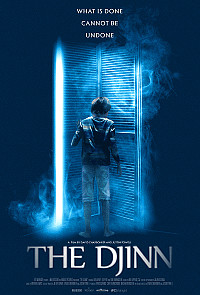 dir-scr David Charbonier, Justin Powell prd Ryan Scaringe, Meghan Weinstein, Carter Armstrong with Ezra Dewey, Rob Brownstein, Tevy Poe, John Erickson, Donald Pitts, Jilbert Daniel, Isaiah Dell, Collin Joe, Omaryus Luckett release US 14.May.21, UK 17.Sep.21 21/US 1h22 Is it streaming?
| 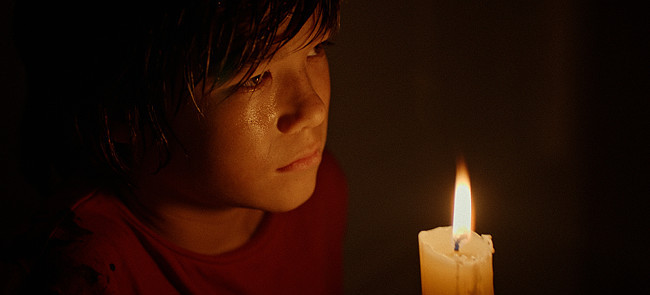 With its mute central character, this thriller is quieter than most, creating a relaxed, realistic tone while the scary stuff gurgles up underneath. Using an elaborate soundscape of music and effects, filmmakers David Charbonier and Justin Powell send a young boy on a horror odyssey contained within his home over one night. It may not be flashy enough for genre fans, but those looking for serious scares will love it. In 1989, preteen Dylan (Dewey) moves into a new apartment with his dad (Brownstein) and he finds a creepy old book that describes a wishing spell. So on an evening when he's alone, he holds the ritual and asks for a voice. But the djinn (Erickson) always demands payment, and Dylan knows that it is now stalking him. His only hope is to survive until his dad returns home in the morning. But the djinn continually ups its game, and it's frighteningly clear that he isn't going to just let Dylan's wish go unpaid. The slow build-up of suspense is so effective that the occasional jump scare feels almost anti-climactic, like a cheap trick when something much more sophisticated was being promised. Still, they keep our nerves jangling. Aside from these loud noises, as well as some added jaunty educational voiceovers explaining the rules as written in this Book of Shadows, much of the film is essentially silent, taking Dylan's perspective as he uses inventive Home Alone-style tricks to escape from this menacing, shapeshifting spirit. He's also still haunted by thoughts of his absent mother (Poe). The expressive Dewey is on-screen for the entire run-time, skilfully holding each sequence on his own. He superbly conveys Dylan's quick-thinking intelligence, while also remaining viscerally scared out of his wits. And since he's so engaging, this leaves us feeling deeply unsettled about what might happen to him. His reactions feel unnervingly authentic, especially as the djinn continually takes on new forms that have different meanings for Dylan. A few other characters effectively create a framework for Dylan's life, but the movie belongs to Dewey While the djinn gets closer to home with each shift in his nasty attack, the film's loose, almost real-time approach tightens in around Dylan as well as the audience. As Dylan faces his darkest fears, the film actually has something to say about how torturous the path to healing can sometimes be. And because Dylan's ordeal stems from his most traumatic moment, the film offers more than simple terror in the final scenes, which encompass emotion, humour and some intense fear.
|
| Saint-Narcisse Review by Rich Cline | 
| 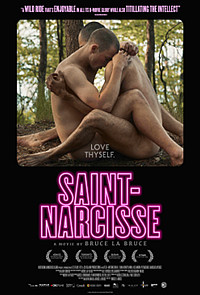 dir Bruce La Bruce scr Martin Girard, Bruce La Bruce prd Nicolas Comeau, Paul Scherzer with Felix-Antoine Duval, Alexandra Petrachuk, Tania Kontoyanni, Andreas Apergis, Angele Coutu, Myriam Cote, Marcello Arroyo, Jillian Harris, Alice Moreault, Gabrielle Boulianne-Tremblay, Anthony Belsile, Jordan Clyde release Can Sep.20 tiff, US 17.Sep.21 20/Canada 1h41 TORONTO FILM FEST VENICE FILM FEST  Is it streaming?
| 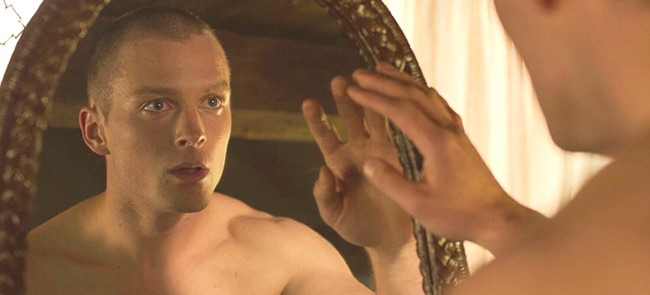 Canadian provocateur Bruce La Bruce creates a superbly visceral experience using witty visuals and themes that continually challenge things like gender, sexuality and religion. The title suggests an exploration of self-love, and the film makes clever use of mirrors and nudity, embracing its 1970s B-movie aesthetic while knowingly juggling hot potato topics. So even as things get properly twisted, there's a remarkable undercurrent of redemption running through the story. In 1972 Quebec, 22-year-old Dominic (Duval) struggles to make a romantic connection because he's only attracted to his own reflection. Raised by his beloved grandmother (Coutu), he's devastated when she dies. But she leaves behind clues that his mother Beatrice (Kontoyanni) isn't dead after all. Indeed, he finds her living in the woods with her younger partner Irene (Petrachuk). Even more shocking is the discovery that he has an identical twin, Daniel (Duval again), living in a secretive nearby monastery with the controlling Father Andrew (Apergis). So Dominic sets out to rescue him. Each of the characters circle around the others with intent, raising mysterious insinuations before revealing their secrets. They all have a tortured past, mistreated by men, the church and society in general, so confessions are both painful and cathartic. There are also enjoyably lurid supernatural angles in the way the brothers sense their connection, while Beatrice seemingly sees all and Irene never ages. Along the way, the plot shifts from drama to mystery to erotic thriller, while maintaining an offhanded, sometimes darkly comical tone. Duval plays Dominic and Daniel as two sides of the same coin, with different shades of light and darkness, even as both are curious and frustrated, quick-tempered and impatient. When they finally meet alone, it's as if they are trying to put themselves back together, interweaving their incomplete histories. Petrachuk is also superbly intense as the tetchy Irene, who knows what she wants and goes for it. And Kontovanni and Apergis both get a chance to add some concerned/creepy layers in their scenes. There's a sly swipe at Insta-culture in the setup, as Dominic continually takes polaroid snapshots only of himself. And Daniel has his own twisted gay conversion therapy, which isn't very effective in a monastery full of young buff men. As each of these people begin to piece together their larger narrative, there are several powerfully moving moments, even as La Bruce escalates the psycho-sexual nuttiness. This slightly obscures the more interesting ideas, but the story still carries a quirky kick.
| 
See also: SHADOWS FILM FESTIVAL © 2021 by Rich Cline, Shadows
on the Wall
HOME | REVIEWS | NEWS | FESTIVAL | AWARDS
| Q&A | ABOUT | TALKBACK | | |||||||||||||||||
